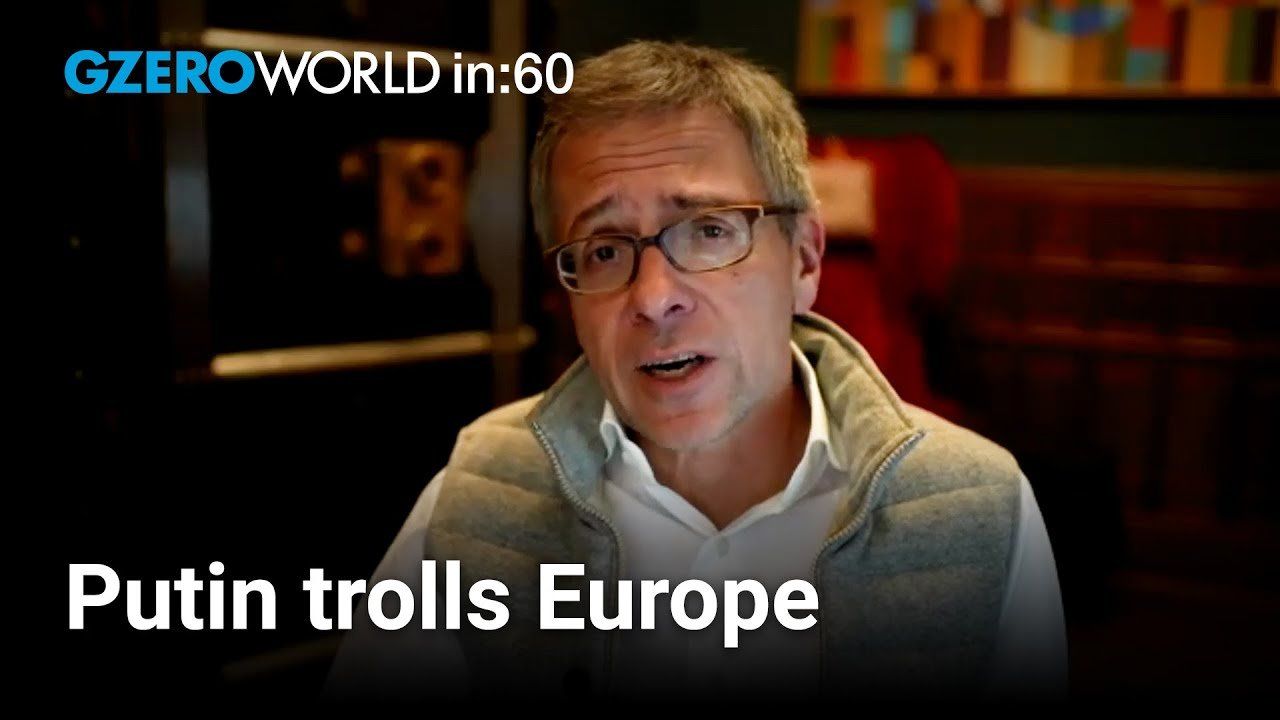Ian Bremmer shares his insights on global politics this week on World In :60.
What does Putin mean when he says Europe "will stand at the feet of the master"?
It means that he loves to troll his adversaries. Don't you remember when he said that he actually thought Biden would be a better president from Russia's perspective than Trump? He trolls. It's all misinformation. It's propaganda. It's all served to undermine and show that he's powerful, and he can say whatever he wants. And of course, he would love to see a fight between the Americans and their allies, whether it's the Nordics on Greenland or it's Canada on 51st state, or it's Panama on the canal, or it's Europe on tariffs. And he wants to undermine the countries that gets a divide and conquer kind of response from Putin. And that is what he is doing when he trolls the Europeans.
What's next for Panama after deciding to exit China's Belt and Road Initiative?
Well, certainly, of all the countries that are facing a deeply asymmetric relationship on the back of threats from President Trump, Panama is high on that list. And they really are trying to find a way to avoid tariffs and avoid the Americans squeezing them on the canal. And an easy way to do that, because they've heard this now directly from Trump and from Secretary of State, Marco Rubio, is that the Chinese have too much influence over transit. And that is particularly true through these port facilities that a Hong Kong-based company, read, China, is in charge of. And so, they are opening investigations into the contract and into how they engage there. And they're also saying they'll pull out of Belt and Road. All of that is clearly going to upset and antagonize the Chinese. And I think that the Panamanians are very, very comfortable showing that they are going to orient much more towards the United States, given how much more they rely on the Americans.
How would a potential Turkey defense pact with Syria reshape power dynamics in the Middle East?
Given who's on the ground in Syria and the fact that the Americans are likely to pull out the over 2,000 troops they have there, and that Trump has said it's really up to Turkey to maintain that relationship, they were the ones that were closest to the rebels that ended up defeating, overthrowing Assad's regime. Not surprised at all that that is where the diplomacy is heading. But that doesn't mean that it's going to be stable, and it certainly doesn't mean that the Kurds on the ground are going to be handled well. And that will be what we need to watch carefully. But Turkey, a NATO ally that has a lot of influence across the region and particularly now on the ground with Syria, I think that'll be relatively stable given the support from the United States. That's it for me, and I'll talk to you all real soon.
- Four reasons why Turkey is excited about the fall of Assad. ›
- Panama ditches key China initiative after pressure from Trump ›
- Putin's nuclear policy revision is a sign of weakness ›
- Russia-Ukraine: Two Years of War ›
- Europe plans for Putin & Trump 2.0 ›
- Trump's dealmaking with Putin leaves Ukraine and Europe with nowhere to turn - GZERO Media ›
- Why Trump won’t break the Putin-Xi alliance - GZERO Media ›
- What will Trump offer Putin in Ukraine ceasefire talks? - GZERO Media ›
- Putin-Trump Ukraine call is a small win for both sides - GZERO Media ›
- Is Europe in trouble as the US pulls away? - GZERO Media ›
- Will Trump pressure Putin for a Ukraine ceasefire? - GZERO Media ›
- Ukraine and European security in the Trump era: Insights from Sen. Elissa Slotkin - GZERO Media ›
- Russian analyst: Let the US and Russia settle the Ukraine war - GZERO Media ›
More For You
People in support of former South Korean President Yoon Suk Yeol rally near Seoul Central District Court in Seoul on Feb. 19, 2026. The court sentenced him to life imprisonment the same day for leading an insurrection with his short-lived declaration of martial law in December 2024.
65: The age of former South Korean President Yoon Suk Yeol, who was sentenced to life in prison on Thursday after being found guilty of plotting an insurrection when he declared martial law in 2024.
Most Popular
In an era when geopolitics can feel overwhelming and remote, sometimes the best messengers are made of felt and foam.
The Hungarian election is off to the races, and nationalist Prime Minister Viktor Orbán is facing his most serious challenger in 16 years.
Does skepticism rule the day in politics? Public opinion data collected as part of the Munich Security Conference’s annual report found that large shares of respondents in G7 and several BRICS countries believed their governments’ policies would leave future generations worse off.
